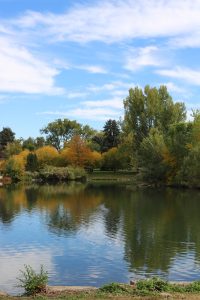
McLendon Park, located at 400 Graymont Avenue West in Birmingham, Alabama, is a vibrant city park that has been a cornerstone of community life since its inception. Situated in the heart of the Graymont neighborhood, this park has a rich history that reflects the city’s growth and development over the years. Originally owned by Samuel Earle, the land was later acquired by the Jemison Company, which envisioned an “Earle Place” subdivision. However, in 1923, the Birmingham City Commission purchased the property, marking the beginning of its transformation into a public space[1].
The park’s creation was influenced by the vision of the Park and Playground Association of America, with J. R. Williams playing a pivotal role in suggesting its development. Commissioners David McLendon and W. L. Harrison were instrumental in negotiating the terms of the sale, which allowed the city to make payments over several years. Their foresight in establishing the park not only provided recreational spaces but also served as a “racial buffer” between neighborhoods zoned for white and black residents during a time when racial segregation was prevalent[1].
One of the most notable features of McLendon Park is Legion Field, a 71,594-seat stadium that has hosted numerous high-profile events, including football games, concerts, and international soccer matches. Known as the “Old Gray Lady” or “The Football Capital of the South,” Legion Field has been a venue for major events such as the Iron Bowl and the 1996 Olympics, where it reached a peak capacity of 83,810 spectators[3]. The stadium’s presence within the park underscores the importance of McLendon Park as a hub for community activities and large-scale events.
The Olmsted Brothers, renowned landscape architects, developed a master plan for Birmingham’s park system in 1924, which included McLendon Park. Their vision emphasized the need for parks to provide spiritual refreshment and physical welfare to urban dwellers. The plan recommended that McLendon Park serve both as a neighborhood park and a site for large athletic fields, highlighting its potential to cater to diverse community needs[1][5].
In recent years, efforts have been made to revitalize and enhance the area surrounding McLendon Park. The Urban Studio at Auburn University’s School of Architecture, Planning, and Landscape Architecture has been involved in projects aimed at revitalizing the neighborhoods around the park. Students have developed strategic plans to improve connectivity between neighborhoods like Smithfield, College Hills, Graymont, Arlington – West End, and Bush Hills by creating community nodes with retail and public spaces. These initiatives also focus on increasing housing density and improving transit infrastructure to better integrate the park with its surrounding communities[2].
McLendon Park’s significance extends beyond its recreational value; it is also a historical and cultural landmark. The park’s location in west Birmingham places it centrally within several neighborhoods, making it a focal point for community engagement and development. As Birmingham continues to evolve, McLendon Park remains a vital part of the city’s fabric, offering a blend of history, community spirit, and recreational opportunities that make it an indispensable asset to the local residents.
In conclusion, McLendon Park is more than just a city park; it is a symbol of community resilience and growth. Its history, coupled with its role as a venue for major events and a hub for neighborhood revitalization efforts, underscores its importance in Birmingham’s urban landscape. As the city looks to the future, McLendon Park will continue to play a pivotal role in fostering community spirit and providing essential recreational spaces for generations to come.
Copyright @ McLendon Park. All rights reserved.
This is not the official website. Content is updated by the community.
If you are the owner, please contact us to verify or suggest edit this content.
Copyright © LocalParks | All rights reserved. Address: 1950 Adams Drive, Damon, TX 77430, United States.